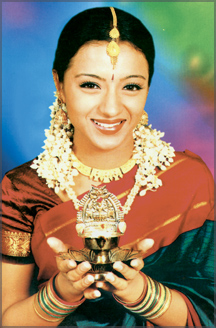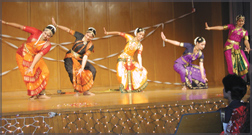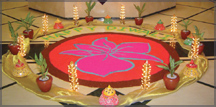|
|
|
|
Deepavali is celebrated almost all over Malaysia. In most respects it resembles the traditions followed in the Indian subcontinent. It is time to invite the Malays and Chinese to their houses. Its a public holiday in Malaysia and time to visit and pay homage to the elders. However crackers are banned in Malaysia.
Mauritius
Mauritius accounts for a 63 percent of Indian majority, of which 80 percent follow Hinduism. Hence, celebration of almost all the Hindu festivals in this island is a common phenomenon. In Mauritius, Deepavali celebration is an age-old tradition.
It holds special significance for the natives, who believe that Deepavali has been celebrated even long before the return of Rama from 14 years of exile and his coronation as the king. The festival is marked by lighting of earthen lamps in rows making images out of the rows. Lakshmi is worshipped as the goddess of wealth and crackers are burnt to scare away evil spirits.
Nepal
Nepal, a multi-ethnic society is the only Hindu Kingdom of the world. Deepavali is celebrated here with the usual Hindu festivities and rituals. Deepavali in Nepal is known as Tihar. Just like most places in India, Deepavali is celebrated here to honour the goddess of wealth and god of prosperity Lakshmi and Ganesh. The festival here continues for five days. Each day has its special significance.
|
|
The first day is dedicated to cows as they cook rice and feed the cows believing that goddess Lakshmi comes on cows. The second day is for dogs as the "Vahana of Bhairava". Preparation of delicious food especially meant for the dog is a typical characteristic of the day. Lights and Deepavali lamps are lit to illuminate the entire surrounding and some of the special items are prepared to mark the third day of the festival.
Fireworks, lamps and crackers are widely used. The fourth day is dedicated to Yama, the Hindu God of Death. He is prayed for long life. The fifth and final day is Bhhaya Dooj dedicated for the brothers who are wished long life and prosperity by their sisters.
Indonesia
Hindus constituent about two per cent of Indonesia's total population. However, the Indonesian island of Bali is famous for celebrating the festival of Deepavali, as a majority of the population here is that of Indians. It is one of the most revered festivals of the locals here. The celebration and rituals of the festival is mostly similar to that celebrated by their counterparts in India.
Thailand
Deepavali is celebrated in Thailand under the name of Lam Kriyongh. Diyas (lamps) made of banana leaves are made and candles are placed on it along with a coin and incense. These are set afloat on a river, which gives a wonderful view together on the water. The festival is not an extravagant affair. People greet each other and wish them happy returns of the day. Distribution of sweets is a common practice on this day.
South Africa
The South African culture is a mix of variety of cultures. The country has almost one million immigrant Indians. Most of these Indian immigrants are concentrated in the eastern regions of the country. About 65 per cent of Hindus, 15 per cent of Muslims and 20 per cent of Christians live in this area.
Due to the majority of the Hindu population, a number of Hindu festivals are celebrated here. Deepavali also holds an important place in the festival calendar of the region. The celebration is more or less same to that in India. Most of the Hindus here are from Gujarat and Tamil Nadu and continue to follow their regional variations of Hinduism.
Britain
The Indians are the second largest ethnic minority in Britain. Deepavali is marked by visit to the local temple to worship the shrine of Lakshmi. Eating special Deepavali sweets, burning of incense sticks, lighting the home and surroundings with lighted Deepavali diyas and the blowing of the conch shell follows the prayer session in the Lakshmi temple.
Although the festival is celebrated amongst the cold, damp and windy months in Britain, the enthusiasm of the festival makes the task of leaving small lamps on windowsills or by open doorways possible ignoring the chill. The Deepavali lamps and Deepavali diyas play their part in maintaining the atmosphere of Deepavali at home.
Australia
Australia has an estimated 100.000 Indians settled in Australia. Most of them are the followers of the Hindu religion. Due to the large number of Hindus, Deepavali is one of the festivals that is celebrated with enthusiasm.
The lighting of lamps and diyas is a common practice. However, the non-availability of the appropriate material or some other reason have influenced and given in the touch of modernity in the celebration of the festival of light.
Japan
Japan also celebrates Deepavali as the day, which awards happiness, progress, prosperity and longevity in life. The festival here is celebrated in a unique way that is not common in India. Here the people go out into the orchards and gardens and hang lanterns and paper made hanging structures on the branches of trees.
Dance and music continues throughout the night. Putting on new clothes and going for boating and broom cleaning of the house are also some of the other related activities of the festival. The places of worship are decorated with beautiful wallpapers to bring in the festive mood and the auspicious beliefs related to the festival.
In the broader context, Deepavali symbolises the age-old Hindu culture, which teaches men and women to vanquish ignorance that subdues humanity and to drive away darkness that engulfs the light of knowledge. It is the festival of lights even today in this modern world and teaches us to uphold the true values of life.
Happy Deepavali!
..................................











